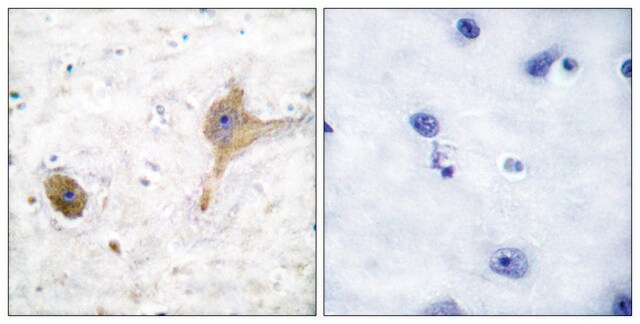06-868
Anti-GABAA Receptor α1 Antibody
Upstate®, from rabbit
Synonym(s):
Gamma-amino butyric acid receptor subunit alpha-1, GABA(A) receptor subunit alpha-1, gamma-aminobutyric acid (GABA) A receptor, alpha 1
About This Item
Recommended Products
biological source
rabbit
Quality Level
antibody form
affinity isolated antibody
antibody product type
primary antibodies
clone
polyclonal
purified by
affinity chromatography
species reactivity
mouse, rat
manufacturer/tradename
Upstate®
technique(s)
immunohistochemistry: suitable (paraffin)
immunoprecipitation (IP): suitable
western blot: suitable
NCBI accession no.
UniProt accession no.
shipped in
wet ice
target post-translational modification
unmodified
Gene Information
mouse ... Gabra1(14394)
rat ... Gabra1(29705)
General description
Specificity
Immunogen
Application
Immunoprecipitation Analysis: 5 µL from a representative lot immunoprecipitated GABAA Receptor α1 in rat brain microsomal preparation RIPA lysate.
Neuroscience
Neurotransmitters & Receptors
Quality
Western Blot Analysis: A 1:10,000 dilution of this antibody detected GABAA Receptor α1 in 10 µg of rat brain microsomal preparation tissue lysate.
Target description
Physical form
Storage and Stability
Analysis Note
Rat Brain Microsomal Preparation Tissue Lysate.
Legal Information
Disclaimer
Not finding the right product?
Try our Product Selector Tool.
Storage Class Code
10 - Combustible liquids
WGK
WGK 1
Certificates of Analysis (COA)
Search for Certificates of Analysis (COA) by entering the products Lot/Batch Number. Lot and Batch Numbers can be found on a product’s label following the words ‘Lot’ or ‘Batch’.
Already Own This Product?
Find documentation for the products that you have recently purchased in the Document Library.
Our team of scientists has experience in all areas of research including Life Science, Material Science, Chemical Synthesis, Chromatography, Analytical and many others.
Contact Technical Service







